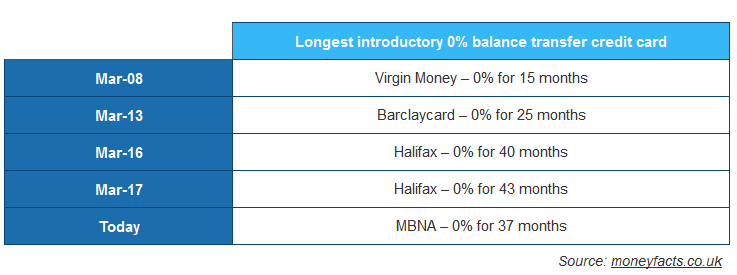Credit Card Customers Prepare for Debt Crackdown
Personal_Finance / Credit Cards & Scoring Mar 06, 2018 - 05:28 PM GMTBy: MoneyFacts
Consumers who frequently use their credit cards to cope with everyday costs and large purchases may be concerned by the latest scrutiny in the market. The Financial Conduct Authority (FCA) has, as of this month, given credit card providers six months to adhere to the new rules that tackle the issues surrounding persistent debt*.
From September 2018, credit card providers must review the last 18-month history of a borrower’s repayment records, if they are in persistent debt, and assess whether they are subject to the new rules. One such rule is intended to help customers pay off debts by adjusting their repayment plan, and another aims to provide details on debt advice bodies. However, the card provider will also have the authority to cease the use of a credit card if the customer does not respond to the proposed changes in increasing their repayment.
Meanwhile, the latest research by moneyfacts.co.uk has found that popular introductory 0% interest balance transfer credit cards are shortening in term-length. These are traditionally the type of cards that consumers turn to, so that they have more time to repay their balance.

Rachel Springall, Finance Expert at moneyfacts.co.uk, said:
“It’s worrying to see the length of repayment time for those using an interest-free credit card shortening, alongside the fear of having their card cancelled; particularly as we face economic uncertainty. Clearly, this is on a worst-case scenario, but for many borrowers who are just about managing, sometimes the minimum repayment on a credit card is all they can reasonably afford.
“Exceeding the minimum repayment on a credit card might be a luxury for some, and these are the types of borrowers who need the most help. The referral to a debt advice body is a good implementation, but it falls back to the borrower to proactively seek out help. If customers who are facing a debt spiral bury their heads in the sand, then they may well see their credit card cancelled.
“Customers who can no longer use their credit card may turn to much more expensive forms of short-term borrowing such as using an overdraft, or in times of desperation, even a payday loan. Therefore, with these changes looming, now is an ideal time for borrowers to seek help if they are struggling; for example, by approaching advice sites for some direction on how to stay out of persistent debt.
“It is hoped that the FCA’s remedies will encourage customers to see the benefits in setting their minimum repayments higher and perhaps it will become more common place. However, it will take time for the market to adjust to these changes. Borrowers would be wise to take advantage of any interest-free offers in the meantime, and try to pay over the minimum repayment if they can afford it.”
*According to the FCA, persistent debt is defined as when customers have paid more in interest and charges than they have repaid of their borrowing over an 18-month period.
www.moneyfacts.co.uk - The Money Search Engine
Moneyfacts.co.uk is the UK's leading independent provider of personal finance information. For the last 20 years, Moneyfacts' information has been the key driver behind many personal finance decisions, from the Treasury to the high street.
© 2005-2022 http://www.MarketOracle.co.uk - The Market Oracle is a FREE Daily Financial Markets Analysis & Forecasting online publication.



